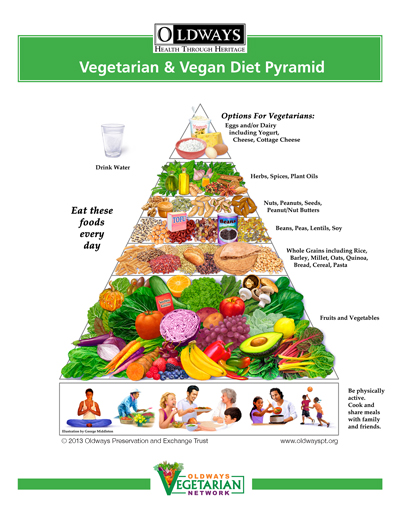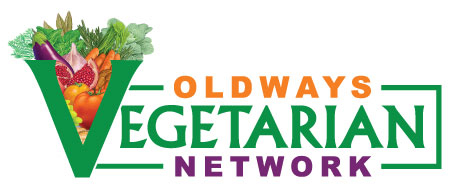Share This
To encourage everyone to put more plants on their plates at home, at work, and when dining out, Oldways has introduced a newly updated Vegetarian & Vegan Diet Pyramid.
In the weeks ahead we’ll be developing more easy-to-use resources such as cooking tips, recipes, meal plans, and other tools as part of our newest program, the Oldways Vegetarian Network (OVN), which puts the new pyramid at its center.
We’re proud of our ability to look down the road and anticipate shifts in how people think about food. And we believe it’s high time to shine a light on vegetarian and vegan diets as mainstream members of our family of traditional diets (Mediterranean, Latin, African Heritage, Asian) – all affordable, scientifically sound options for a healthier life.
Our original Vegetarian Diet Pyramid was presented at the 1997 International Conference on Vegetarian Diets held in Austin, Texas. To create our new pyramid, we brought together a world-renowned scientific committee to review the scientific data on plant-based diets and provide recommendations.
Oldways has been invested in the science behind plant-based eating for years and is dedicated to inspiring people to find ways to eat more vegetables and plant foods – every day or every meal. As our decades-long exploration of the health benefits of traditional diets reinforces, many variations of vegetarian diets have existed in different cultures throughout history. The Traditional Vegetarian Diet illustrated in our new pyramid reflects the vast variety of delicious, nutritious foods – vegetables, fruits, nuts, seeds, whole grains, legumes, herbs and spices – that fit into this healthy eating pattern. And we’ve included the Vegan Diet as well, since this pattern includes every tier of the pyramid except the very top.
Plant foods are all the rage these days, for many very good reasons. They’re economical, they’re available at your local supermarket, they’re easy to prepare, and they’re delicious. Choosing to build your diet around them can help you lower your risk of heart disease, high blood pressure, type 2 diabetes, obesity, cancer, inflammation, and elevated blood cholesterol levels. It can also help you experience a longer lifespan, achieve weight loss and weight management goals, and reduce your carbon footprint on the planet.
As a nation we are slowly but steadily moving away from meat at the center of our plates. Nearly half of all Americans eat vegetarian meals one or more times per week. Meatless Monday, the initiative designed to encourage everyone to eat a vegetarian meal one day a week, celebrates its 10th anniversary and a decade of nutritional progress this month. According to a 2012 national survey commissioned by The Monday Campaigns, 59% of respondents said they had cut back on meat in the past year; 41% said they were actively trying to do so and 62% report that health is their primary reason.
Meatless options are popping up on menus at all kinds of eateries, from food trucks to high-end restaurants, to college dining halls. Restaurants from coast to coast are taking haute vegetarian cuisine to a broader audience, demonstrating a world of exciting new techniques and flavor combinations, proving that terms such as smoked and blackened work beautifully with vegetables, and offering a whole new lexicon: Beet pastrami, cauliflower veloute, wok-charred cabbage, sweet potato pate, portabella carpaccio, carrot shawarma. Chef Rich Landau, who presides over the acclaimed Vedge restaurant in Philadelphia, has been a Food Network star and three of his restaurant’s haunting vegan sauces are now sold by Williams Sonoma. Le Verdure, one of seven sit-down restaurants at New York’s vibrant marketplace, Eataly, showcases vegetarian cookery with 13 daily dishes featuring seasonal produce, beautifully and simply prepared. In Bar Harbor, Maine, Portland Oregon, and countless locations in between, it’s now possible to find delicious meatless meals on the menu.
This summer, we surveyed more than 1,000 dietitians about their attitudes toward plant-based diets and learned that 96% of these important influencers believe that plant-based diets, including vegetarian and vegan, can be healthful, although less than 15% of them were vegetarian or vegan themselves. Yet only 39% said they felt comfortable counseling patients and clients about these diets, and 90% said they would like more information, including recipes (84%), meal plans (68%), nutrition handouts (69%), and our new pyramid (65%).
We’re hard at work building a new collection of resources to dispel the myths about plant-based diets. Stay tuned! And please join us, by putting lots of plants on your plate.
-Georgia



Add a Comment